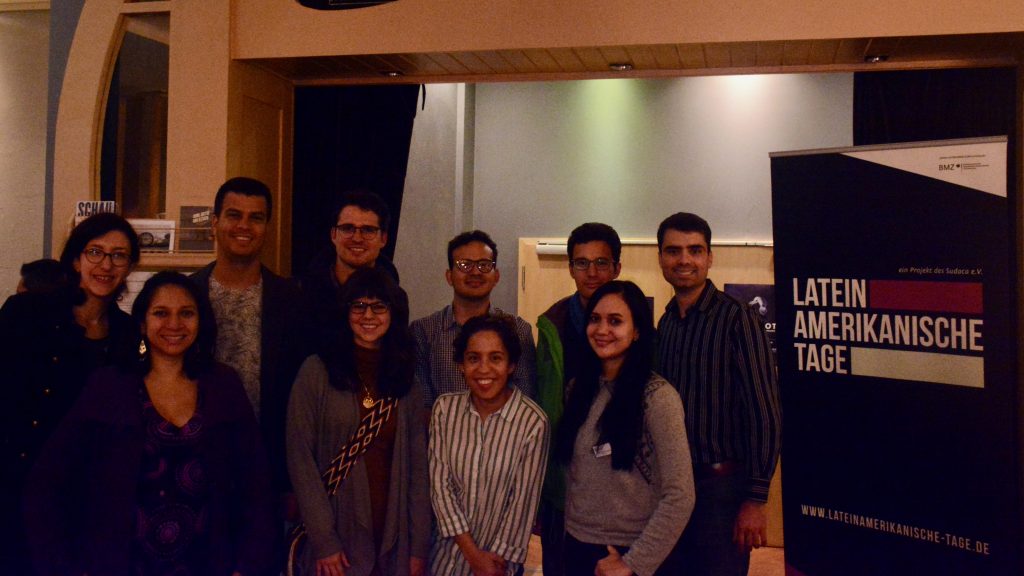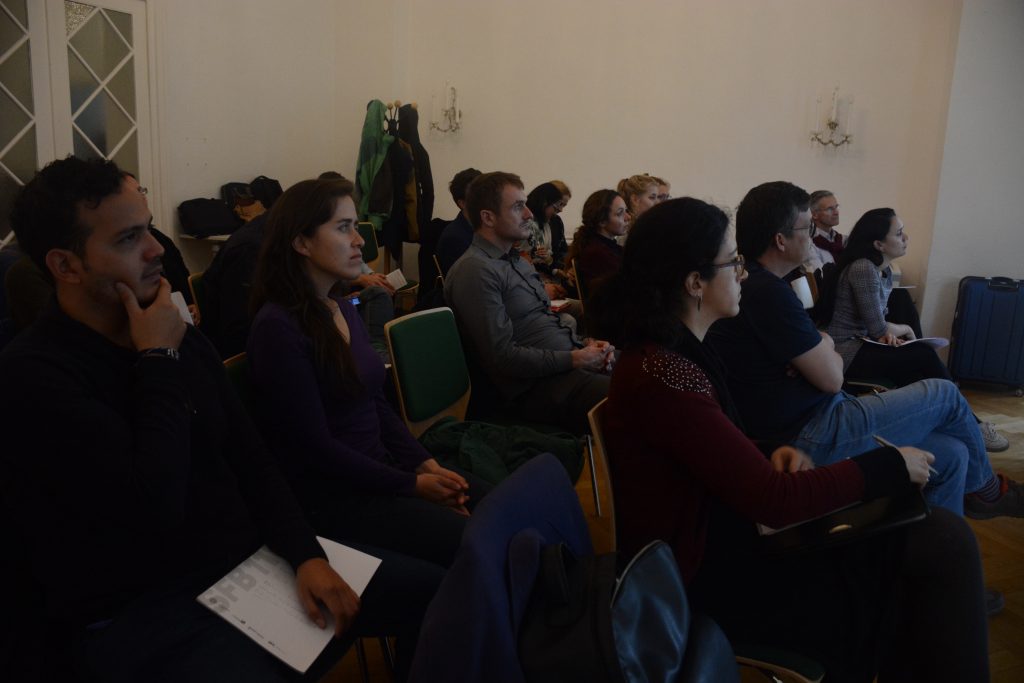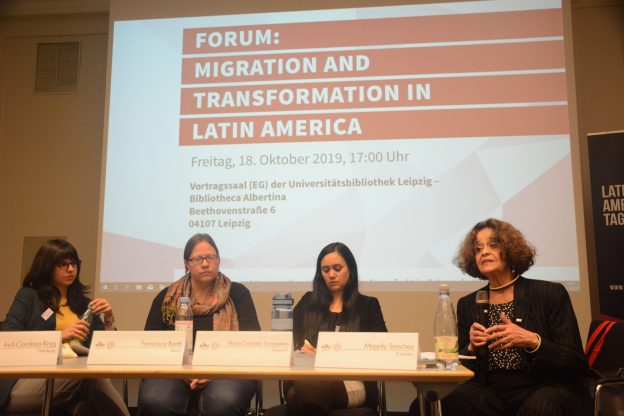by Ansgar Engels, University of Leipzig
Conference Conveners: CEL-LE – Coloquio de Estudios Latinoamericanos Leipzig, Graduate School of Global and Area Studies of the University of Leipzig, in cooperation with the Chair for Comparative History/Ibero-American History of the University of Leipzig and the film festival Lateinamerikanische Tage.
CEL-LE is a study and research group initiated in 2019 by 4 scholars (Carolina Rozo, Agustina Carrizo de Reimann, Daniel S. León, and Karen Silva Torres) with the purpose of strengthening Latin American Studies at the University of Leipzig. With this aim, Cel-Le organizes the annual conference “Latin American Transitions”. During the three-day event, junior researchers and experts from different academic backgrounds in social sciences and humanities reflected on and discussed past and present processes of reconfiguration in Latin America. The debate was guided by the questions: When and where do we identify turning points leading to processes of reconfiguration in the subcontinent? How have local, regional, national, and transnational actors contributed, adapted to and challenged processes of recomposition?
In the afternoon on the 17th of October, the conference started with a welcome meeting and the participants proceeded to watch the opening film Cómprame un revolver within the frame of the film festival Lateinamerikanische Tage.

On October 18th the first panel about populist reconfigurations moderated by KAREN SILVA TORRES (Leipzig) began with a historical outline of the refugee regime in Brazil presented by VINÍCIUS CRUZ CAMPOS (Oldenburg). Campos focused on the refugee regimes under different Brazilian governments in the 20th century. He drew the conclusion that populist policies endangered the refugee regime that was established in Latin America through the Cartagena Process in the year 1984. The discussion turned from Brazil to the case of Peronism in Argentina. JULIA FIERMAN (New York) addressed the function of emotional discourse as a central component of the Peronist ideology. In her interviews with militants of the kirchnerismo, one branch of Peronism, interviewees stressed their emotional attachment to core values like compañerismo (comradeship), social justice and love as a way to define the essence of the movement. ESTEBAN MORERA APARICIO (Tübingen) delivered a theoretical definition of populism. The main problem, as he argued, is to make populism an operational analytical category. Building on Ernesto Laclau’s approach, he pointed out the need of considering the horizon of future expectations to generate political demands, since political communities are built precisely because of future and not past expectations, as these expectations are used to justify political actions. To exemplify the devastating consequences that populist policies have caused in recent times, MAGALY SANCHEZ (Princeton) analyses the “catastrophe” of Venezuela. For Sanchez, the process of the destruction of the Venezuelan society is without precedent. She sees three principal elements: the relationship between the state and the society, the humanitarian collapse and the massive migration. In the course of the regime of Hugo Chávez, populist policies gradually progressed into authoritarianism. According to Sanchez, the Venezuelan political regime is not a failed state but a network of criminal alliances sustained by dysfunctional criminal economies. In the following discussion, participants explored further the different approaches to the dynamics of populism and explored the possibility to compare diverging cases, such as Argentina or Venezuela.
The second Panel about national reconfigurations chaired by DANIEL LEÓN (Leipzig) started with a closer look at the presidential elections in Mexico of 2018. LUIS EDUARDO LEÓN GANATIOS (Guanajuato) investigated the interplay between the three coalitions and their corresponding most important issues: corruption, economy, and delinquency. For example, Andrés Manuel López Obrador, the current Mexican president, made not the concern over criminality connected to the voting blocs of the rich and middle classes his main electoral issue, but corruption. In the second presentation, MARGARITA CUERVO (Munich) explained the reconfiguration of the National Army of Colombia under new political circumstances. The Colombian Army enjoys a big prestige in society and in comparison to other Latin American countries it can acquire a lot of public funding. Although reform of the military was not planned in the light of the FARC agreement, inside the army the idea arose to adopt new tasks beyond the internal focus on public order. The Colombian Army has aimed to export its security expertise like conflict management. Still, it should be questioned what kind of security products the Colombian Army actually means to export. The last contributor to this Panel, RAFAEL CASTRO (Hamburg), reflected upon the ideological components in the reconfiguration of Colombian foreign policy. Methodologically, Castro proposed a poststructuralist approach and introduced the example of the government of Ivan Duque. Castro pointed out that the situation in Venezuela acts in the discourse of Duque as a way to create antagonists and oppositions. The Colombian president brands the regional organization UNASUR as ideological and “Venezuelanized”, meanwhile he proclaims the opponent institution PROSUR to be pragmatic and more flexible. During the exchange of ideas after the presentation, participants discussed the ideological implications of the claims of professionalism and pragmatism in political discourses. In addition, the participants deliberated about the differentiation between corruption and criminality.
The third Panel addressed cultural reconfigurations in Latin America chaired by AGUSTINA CARRIZO DE REIMANN (Leipzig). FLORIAN GRAFL (Munich) proposed to examine processes of social reconfiguration during the period of independence by means of analyzing the national sketch collections of Cuba and Mexico. Grafl compared the national sketch collections of these two countries with its predecessor in Spain to indicate differences and similarities in using stereotypes and manners to construct national identities. ARIANE KOVAC (Bonn) referred to the cultural reconfiguration triggered by evangelical communities in the former civil war region Ayacucho, Peru. The rise of evangelical churches during the conflict was directly related to the absence of the Catholic Church, as well as their ability to supply a new community identity. Regarding the remembrance of political violence, Kovac highlighted that the forgiving perpetrators were a distinguishing feature of evangelical believers. In this way, also former perpetrators, who joined these churches, were able to redeem their sins. The discussion to this panel addressed both on the construction of target groups by national sketch collections and the methodological challenge posed by the analysis of pictures. Regarding the role of pentecostal churches in Latin America, participants discussed their growing significance as an electorate power and elaborated on the issues of violence, women, and ethnicity within pentecostal movements.

The second day of the conference concluded with an open forum for a broader audience on the topic of migration and transformation in Latin America chaired by Magaly Sanchez. After a general introduction by Sanchez about how the global phenomenon of migration in the 21st century differs from the 20th century, MARIA GABRIELA TROMPETERO (Bielefeld) talked about the massive flow of Venezuelan migrants to Colombia. She stated that currently there are approximately 1, 4 million Venezuelans living in Colombia. In view of this migratory wave, a new migration law based on the Cartagena Refugee Regime was enacted, allowing extension of the right to asylum. This strong response of the Colombian State marks for Trompetero an exemplary model of how to deal with problems caused by massive migration. FRANZISKA BARTH (Berlin) referred to the impact of migration processes in the Sierra de Zongolica, Mexico, on family constellations and gender roles. Mostly men from this poor region migrate in search of job opportunities to the USA and Canada. However, the goal is always to go back to their homes with enough savings. Barth could show that, in the absence of their men, women take more responsibility for the households and their communities. As a consequence, women have started to undermine the patriarchal system of this region. In her presentation, INDI-CAROLINA KRYG (Hamburg) argued for the need to consider migrants as political actors and not to victimize them. Based on her interviews with Central American immigrants in three cities in Mexico, she displayed the diversity of political participation on account of the immigrants. In the discussion afterward, the audience pointed to the paradox of the discrimination of the Central American immigrants in Mexico in view of Mexican migrants’ comparable experience in the US. All keynote speakers underlined the fact that migration has been foremost an enrichment for receiving societies.
On the last day of the conference, the 19th of October started with the panel dedicated to the analysis of alternative strategies of local actors in conflict situations. The panel was organized in cooperation with Ph.D. Students from Katholische Universität Eichstätt-Ingolstadt and members of Zentralinstitut für Lateinamerikastudien (ZILAS). THOMAS FISCHER (Eichstätt), who chaired the panel, introduced the broad definition of conflict, on which the presentations built, and their approach “from the bottom up to the top”. JIMENA SALAZAR (Eichstätt) began by outlining the socioecological conflict caused by the contamination of water reservoirs by illegal mining industries in the region of Andahuaylas, in the second poorest region in Peru. Against the threat posed by the family-owned mining companies to the survival of farmers’ communities, social organizations have become active. Salazar analyzed the role of the state and juridical pluralism in these rural communities within the context of the negotiations between 2011 and 2017. MAXIMILIAN GÖRGENS (Eichstätt) introduced the case of indigenous resistance against the destruction of the Parque Nacional Isiboro Sécure in Bolivia. Based on the theory of frame alignment from David Snow, Görgens chose a qualitative approach by conducting various interviews to investigate the specific problems of this conflict. Despite Evo Morales’ identification with the indigenous cause, “development” remains a threat to the Bolivian nature reserve and is deepening the internal division within local indigenous communities. During the discussion, participants exchange ideas about the role of the researcher and her/his responsibility to establish a relationship based on trust with the informants. Furthermore, the relationship between law and disorder and the concept of the state were also addressed.
The challenges for indigenous resistance also affects the digital realm, as ULRICH MORENZ (Eichstätt) described for the case of activists of the Minga in Cauca, Colombia. Morenz looked into the strategies to legitimize and delegitimize the indigenous protest movement. In the current media landscape of Colombia, there is a high concentration of the mainstream media in the hand of a few companies which are not representing the interests of the indigenous people. For that reason, the activists’ social media campaign during the blockade of a crucial traffic center was very important. NATALIA VELASQUEZ (Eichstätt) examined another example of how to develop new strategies to overcome socio-political conflicts in Colombia. For this aim, she referred three cases in the department of Santander. Considering the peace treaty with the FARC, Velasquez defined the actual phase as “post-treaty” and not “post-conflict”, since new agents have been entering the scene as new conflicts are arising. The inhabitants of Santander, who want to leave the conflict behind, emphasize their will to stay in the territory and to have a dignified life. As key points of her research, she highlighted the significance to engage in collective actions, to analyze the issue of delegitimizing armed combatants and the intersection of distinct dynamics on local and territorial levels. Participants debated the role of social media in the present conflicts and pointed to the need to further investigate the impact of Twitter on the perception of indigenous activism. The role of Venezuela came back as a relevant example of the process of social reconfiguration in the study introduced by Velasquez. Also, the capacity for mediation between municipalities and the government in Colombia was discussed.
The speakers of the fifth Panel introduced and discussed the topic of access to resources, resistance and international dependency chaired by RALF LEITERITZ (Bogotá). DANIEL LEÓN started by addressing the stability of the authoritarian regime in Venezuela and depicted it as a case of survivalist equilibrium, shaped by the alliance of the regime with the military in a time of low oil prices. When the stakes of holding the power increased in 2014 the regime eliminated “expensive” partners while the coercive apparatus guaranteed its support for the government by means of repression. Now the costs for a political exit of the chavismo are too high with the effect that the survivalist equilibrium is the best rational choice for the regime. With the purpose of taking a comparative approach to Venezuela’s dependency on oil, MOHAMMAD REZA FARZANEGAN (Marburg) discussed the link between oil income and the middle class in Iran. Using econometric tools and based on historical data from the last decades, he developed a model that defines the effect of the oil income on the development of the middle class and foretold a positive response to an oil shock for the middle classes in the future. Farzanegan concludes that oil income generates a positive outcome for the middle classes. During the discussion, the participants exchanged their ideas about the consequences of the oil business for political institutions, such as taxation policies and the role of neoliberal reforms in the face of a crisis. Considering the dramatic situation in Venezuela it was also questioned whether the concept of political order should be applied to the current regime, and disorder should be used instead of political order. In addition, it was discussed which other significant economic variables besides oil should be considered for the analysis of Venezuela.
The conference closed with a final discussion on the transition process of Latin American research. The conveners opened the debate by asking the keynote speaker MATTHIAS MIDDELL (Leipzig), why Latin-America remains underrepresented in the field of the Global and Area Studies. Middell pointed first to the fact that there are not many Latin American experts working with a global perspective. From his point of view, it seems therefore necessary that Latin American researchers engage more actively in transregional studies and that further decolonization from the influence of the US-American social sciences takes place. Furthermore, Middell argued that Latin American universities have to build broader networks and develop their capacities to organize in the field of Global and Area Studies. The discussion then turned to the political engagement of scholars. Middell pointed to the general dilemma faced by researchers willing to contribute to the political discussion, their need to take funding and how this can challenge personal and intellectual independence. Thomas Fischer argued that, despite the risks, researchers nowadays are compelled to engage in the public debate and that Latin American experience may be an inspiring example for this purpose; for instance, in order to understand the dynamics of multicultural societies in Europe and of social movements looking for alternatives to the hegemonic capitalist society. For this aim, researchers must as well reflect upon their place of enunciation, in order to prevent unproductive eurocentrism. The lack of professors dedicated to the study and research of Latin America at the University of Leipzig was described as a significant setback for both the study of the global condition and the deconstruction of the production process of academic knowledge.
***
The 3rd conference on Latin American Transitions convened by CEL-LE will invite scholars to discuss, “Disruptions of Latin American Democracies: Roots and dynamics of current conflicts.” The conference will take place in October 2020.
